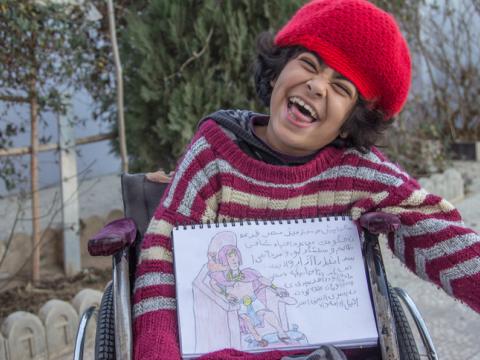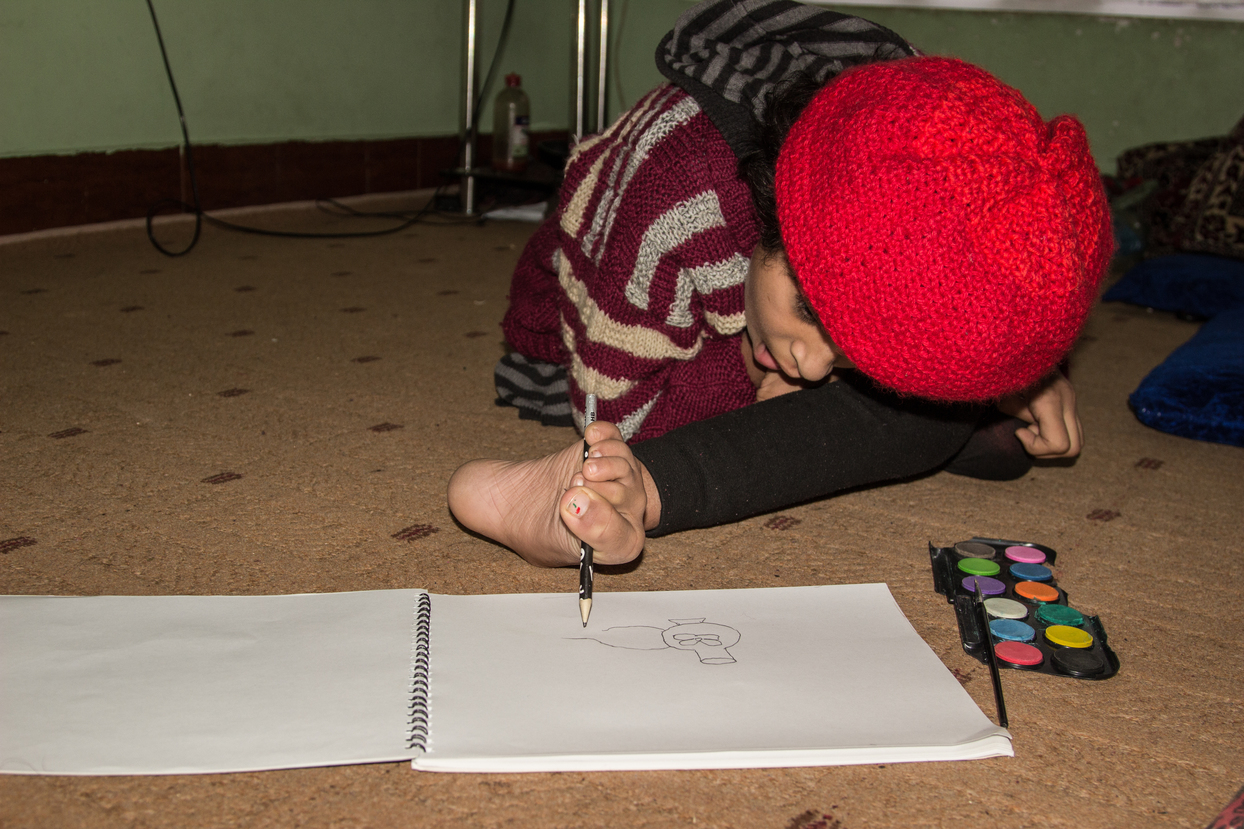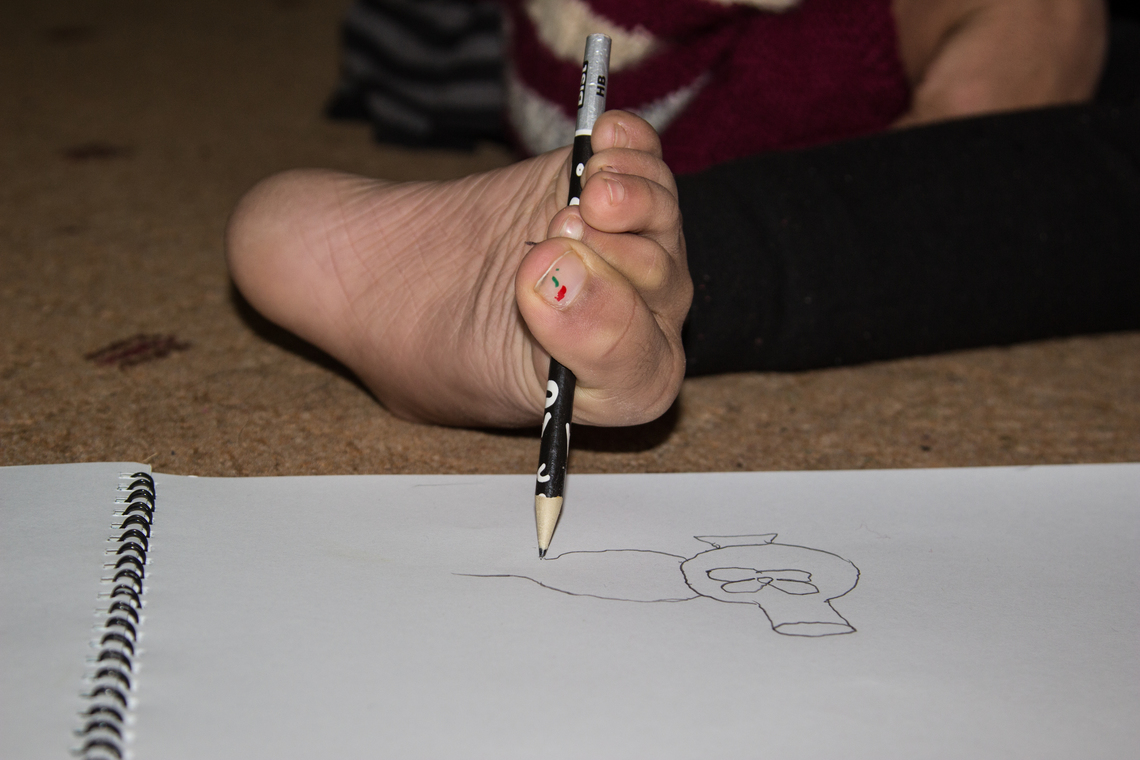Against all odds

What would you do if you had a talented mind but were unable to make your needs known or express yourself in the way that a physically able person can? Would you retreat into yourself, stay home and close all of the doors?
Shaysta, 13, and her family, live in an area in Herat designated for Internally Displaced People (IDPs). Originally from Paktia province, the family fled war, internal conflict and bad economic conditions, landing in Herat where they had to start life over from scratch. With their dislocation came the need for psychological support and resilience training to recover from the trauma of their experiences.
For Shaysta, life has a different set of sensations than it does for most. She was born healthy, like most children in the world, but an accident led to a permanent physical disability and speech disorder. Shaysta can’t speak properly; the words and sounds that come from her mouth are only understandable to her mother and family.
“She was only one-year old when she fell from a swing in a park,” says Rashma, Shaysta’s mother. “She was crying a lot. We took her to a doctor. The doctor prescribed sleeping pills. I gave her a pill almost every night for one year.” Without the pills Shaysta would cry all night, unable to sleep.
“I preferred giving attention to my other children.”
It was Shaysta’s second birthday when her mother realised that she was different from her siblings, that she couldn’t talk or stand on her feet. “I had given up working more with Shaysta because of her disability,” she says. “I preferred giving attention to my other children.”
The days passed and Shaysta was growing up. She saw that her brothers and sisters could walk, play together and go to school, but she had to stay at home all of the time. According to her mother, Shaysta “suffered from stress and insomnia. She took anti depression pills and didn’t eat properly. [From the age of four, when she first started speaking words] she expressed to me many times that she was tired of this kind of life.”
"I had a lot of other things to be concerned about rather than Shaysta’s situation or her interest in painting.”
To escape from the darkness Shaysta began to search for her own little light. “I noticed that whenever her sisters and her brothers were doing schoolwork, she crawled toward them, took their pencil and notebook and started drawing lines on the paper,” says her mother. “To be honest with you I didn’t feel that it was very important. I had a lot of other things to be concerned about rather than Shaysta’s situation or her interest in painting.”
But Shaysta had discovered something indelible. Unable to use her hands, she began painting the pictures of her world with her feet.
A Rescue Ship for IDPs
In 2015, World Vision Afghanistan (WVA) started a project entitled “Emergency Health & Protection for Herat Displaced Persons” to provide life-saving emergency health services, trauma counseling, psychosocial support and child protection services to Herat IDPs. The project, funded by the Government of Canada, focuses on the physical and emotional well-being of youth living in IDP areas in Herat.
The project has established eight youth clubs within IDP schools. These clubs allow access for children aged 6-12, and adolescents aged 12-18, to protective services and psychological counseling in the areas of acute stress, grief, moderate to severe depressive disorder and post-traumatic stress disorder, in gender-specific sessions. Through the sessions, children and youth learn how to self-support in harsh situations and how to deal with the ups and downs of life.
How Shaysta found out about the youth club
Shaysta’s sister, Zohra, is an active participant in the youth club in her school. One day Zohra asked her mother if she could take Shaysta to the club as well. “When Zohra told me about the session I said that it was probably meant for healthy children, not for children like Shaysta,” Rashma says. But Zohra insisted, and the next day Rashma accompanied her to the youth club to talk with the counselor.
Fershta, a WV Youth Club Counselor, says, “When Rashma told me about her daughter I encouraged her to bring Shaysta to the club.” The counselor was surprised and amazed by the passion and focus that Shaysta put into her art. “She drew lines and different shapes by foot without any initial teaching, even better than a healthy child could.”
Shaysta while painting by her her foot
Since then Shaysta has been a recognised and popular member of the youth club. Despite her inability to speak she listens actively to the counselor’s talks about life skills and receives individual counseling. The counselors have not only provided psychosocial counseling for Shaysta but have taught her mother Rashma how to interact with her daughter compassionately and how to respond to her emotional needs.
Rashma can notice the difference in her daughter. “She eats properly. She wakes up early in the morning with energy and a smile on her face. She can sleep better at night. The counselor has given her a lot of painting supplies. She isn’t the Shaysta she was [before attending the youth club].”
After participating in the sessions, Shaysta’s painting skills improved and she is able to express her unique talents and perspective through her art. The youth club sessions have not only improved Shaysta’s resilience psychologically and emotionally, but have also motivated other students to learn from her passion and art. “She is a good painter,” Says Fershta, “she has even started to teach some of the other students how to draw. She has made a lot of friends in the club.”
Shaysta is able to express herself enough to communicate the gratitude she feels toward the counselors who have opened up her world.
World Vision is one of the first agencies to deploy the new 2015 Mental Health Gap Action Programme (mhGAP) Humanitarian Intervention Guide for standards of care in mental health and psychosocial support globally and in Afghanistan, which is the primary document used to train counselors at the Centre. Through the support of this project, WVA was able to meet the primary health and protection needs of 48,045 displaced people in Herat over the course of two years.

